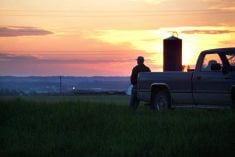As questions go, this isn t exactly new. What do young people want? Every generation has wondered at the behaviour of their young, and every age has questioned the wisdom of its children s long-term goals.
Granted, it doesn t help that the question sometimes gets asked with sarcasm in the voice and a raised eyebrow, but mostly there is good intent behind it.
A perplexing problem presents itself when the question is asked on the farm, though. Children don t seem to be wired to give answers with lots of specifics, but their parents know that if the farm is going to survive through succession, the specifics are exactly what the children have to be good at.
Read Also

The big squeeze: How to be fair to siblings during farm succession
Managing sibling business relationships on family farms.
In the past, our wants and needs were differentiated. If you didn t need something to survive or prosper it couldn t be all that important. That was the thinking of a post-war generation bent on success at any cost. And it made sense. Who could think about the frills while trying to make a go of farming, whether seeding the bald prairie or mired in an Ontario clay? That pesky memory of the Depression made financial success paramount, motivating farmers to work harder and longer to get ahead.
But the shift happening amongst corporate managers, professionals and small business executives has come to the farm. Young farmers want more. This doesn t necessarily translate into the desire for more wealth, though that would be nice, but instead is articulated in a desire for a better life, however that s defined.
This shift has led to an increasing number of young farmers who see the farm as a means to an end, as a business through which to attain the balance of income and lifestyle. These are goals vastly different from those the older generation might have had. Or perhaps they are things for which their parents wished all along, but didn t dare to ask.
Andrew Monchuk is 30 years old. He s married to Pam and they farm with his Dad near Lanigan, Sask. Andrew has been farming full time since finishing his agriculture degree in 2003. At 1,750 acres, their farm is relatively small by Saskatchewan standards, but the family is expecting to expand to 2,500 acres next year. They have 1,000 acres of grass and pasture, run 50 cows, and background calves over the winter.
What does Monchuk want as a young farmer? He defines things in terms of personal and financial goals, though the two overlap. He d like to see his farm business be financially successful so he can expand, but also so he can farm in a sustainable manner. He d also like the farm to make enough money to raise a family and provide for the eventual retirement of his folks.
Like many, his goals get a little fuzzy when he talks about the personal side of things. Simply put, he wants to have a successful farm and enjoy being there.
You see people who hate the farm. I don t want that, Monchuk says. Enjoyment comes from two angles. First there is the independence farming offers. I don t have to punch a clock. And to a certain degree I get to decide what to do and do it. I don t have to ask permission& well except from Dad, he laughs.
Second, Monchuk enjoys the lifestyle farming offers. He lives in an area with a huge potash industry where there is no lack of high-paying jobs. But he questions what people in that industry give up in order to get ahead, most importantly family and leisure time. The Mon- chuks have a long-term goal to see both Andrew and Pam working full time on the farm, something you couldn t conceive of in many other industries.
Still, such goals are common in family businesses of any nature, says Art Lange, farm and industry adviser with AJL Consulting out of Sherwood Park, Alta.
Most family businesses come about in the first place because the individuals want some control over their personal lives and to be independent, Lange says. I saw farmers in crisis five years ago who found a way to make it (their farm) work because their lifestyle was paramount. Any independent business people cherish their independence and being responsible for driving the business.
At the same time young farmers don t necessarily want the farm to be the be-all and end-all for their total lives, Lange says. They want private time for themselves and their families separate from, or away from, the farm.
And they want a good income and the ability to influence decision-making. Sometimes the younger generation is seen as glorified hired labour, they are not well paid and not part of decision-making, Lange says. Why would they stay? The next generation cares about a living income, however that s defined. They are not willing to live on a low income just because there s a side of beef thrown in.
The older generation stuck with it. If they had a few good years they lived on that and simply kept plugging away during the bad, Lange says. Quitting and selling out was seen as a failure.
That s not good enough for today s young farmers, who bring other lessons from industry to the farm. They want to have business plans, marketing plans, set goals and objectives, and determine how to get there and the measures of success, Lange says. Saying Someday this will all be yours may backfire if they look at the books and it scares them away.
If young farmers don t see a hope of success on the balance sheet, they are more willing to walk away from an unprofitable farm. Lange believes part of the onus then is on older farmers to have their affairs, such as debt, in order so that succession doesn t cripple the younger generation.
Andrew Monchuk believes this last point is a two-way street. We (young farmers) have more of a sense of entitlement than our fathers did, he admits. We see a guy with 5,000 acres and want to be there today. That guy might have taken 30 years to build to that point.
His father is still actively farming and Monchuk is realistic about the time it will take. It s a partnership in transition& kind of a mentorship program that allows me certain freedoms, he says. Mine will be a long-term apprenticeship. I have to learn the pieces of the puzzle as I go and the more I learn and the more I can do, the more responsibility I can take on.
Planning, adapting and using technology all enter into the picture. While we all know you can t avoid the busy seeding and harvest seasons, Monchuk believes there are tools that can help optimize time for things other than farming. Marketing decisions can be set out ahead using technology and using tools such as futures and options. If you can plan your marketing schedule, you can also plan a holiday around that.
Labour is an issue for any farm and the booming industrial sector in Saskatchewan is driving up wages. I think you have to be able to adapt to every situation and be willing to hire someone, and pay what they need in order to reduce stresses and get the job done and have time with family, Monchuk says.
Monchuk also believes he will have to make realistic decisions based on the indicators that Art Lange talks about. If we got too big and couldn t find help, then we d have to look at downsizing, fewer cattle, less land or whatever the situation is and what the business plan looks like, Monchuk says. You can work smarter and not necessarily harder, and be better off.
That s not likely to be something you d have heard come out of a farmer s mouth 50 years ago.CG














